On November 10, an international seminar on digitalization-empowered cultural heritage protection was launched at Dongcheng Culture Development Research Institute in Beijing. The seminar was hosted by Beijing Municipal Cultural Heritage Bureau, Beijing Municipal Office for Conservation and Management of Central Axis, and the International Center for Creativity and Sustainable Development (ICCSD) under the auspices of UNESCO. As one of a series of events in Beijing to commemorate the 50th anniversary of the Convention Concerning the Protection of the World Cultural and Natural Heritage (hereinafter referred to as the Convention), the seminar was held online and offline, focusing on the roles of digital technologies in the protection of cultural heritage. Experts and representatives from UNESCO and the fields of world heritage and digital technology were invited to discuss how digitalization can empower the protection and inheritance of cultural heritage.
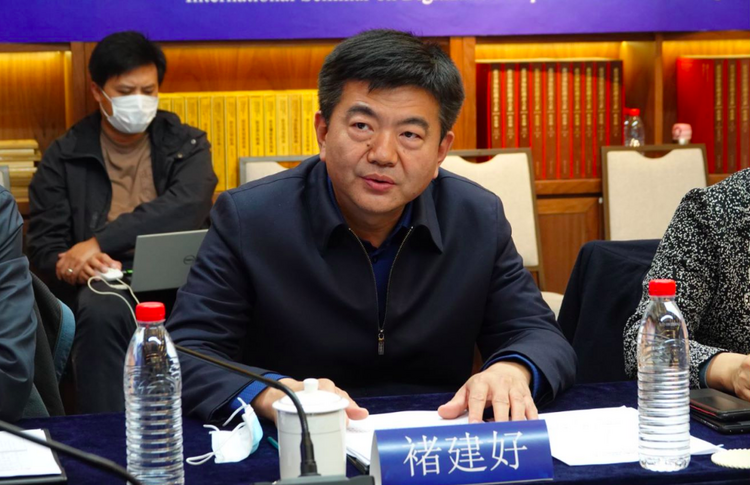
Chu Jianhao, Deputy Director of Beijing Municipal Cultural Heritage Bureau and Deputy Director of Beijing Municipal Office for Conservation and Management of Central Axis, delivers a speech.
Chu Jianhao, Deputy Director of Beijing Municipal Cultural Heritage Bureau and Deputy Director of Beijing Municipal Office for Conservation and Management of Central Axis, shared "practices of digitalization on Beijing's Central Axis" in his speech from three aspects, namely strengthening digital protection and renovation, planning digital displays and exhibitions, and building digital communication platforms. In recent years, Beijing has continuously promoted the protection, revitalization and utilization of cultural relics on the Central Axis, and launched a series of digital exhibition projects and digital cultural products, so that the public can immerse themselves in digital cultural scenarios on the "cloud" and appreciate the vibrant Central Axis culture. Chu hoped that this seminar would provide an opportunity to share new modes of digital protection and inheritance of cultural heritage, and discover new trends of cultural heritage protection and development in the future, so that countries around the world can jointly contribute to the prosperity and development of digital culture, and boost digital protection of cultural heritage around the globe.
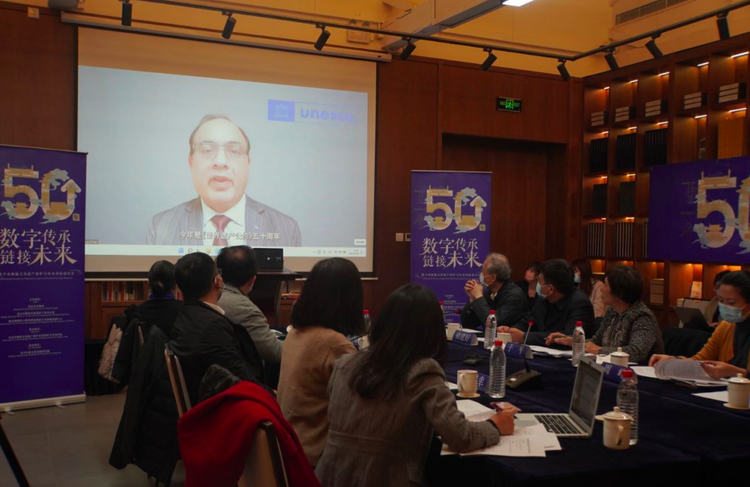
Shahbaz Khan, a representative of the UNESCO Beijing Office, delivers a video speech.
Shahbaz Khan, a representative of the UNESCO Beijing Office, believed that, in the past 50 years, the Convention has resulted in remarkable achievements; however, the challenges faced by global heritage protection have increased dramatically in the past five years, and the COVID-19 pandemic has completely changed the ways tourists visit different places and the ways heritage practitioners work. These challenges have accelerated digital transformation and enabled the widespread application of digitalization practices to heritage protection. In his opinion, the seminar would help promote the new achievements of digitalization practices among cultural heritage institutions, stakeholders and policymakers, and spark insight into the advantages and limitations of digital solutions in the field of heritage protection. Khan expected digitalization to provide better, more extensive and more equal opportunities for heritage practitioners and the public, as well as improve the capacities of heritage site management worldwide.
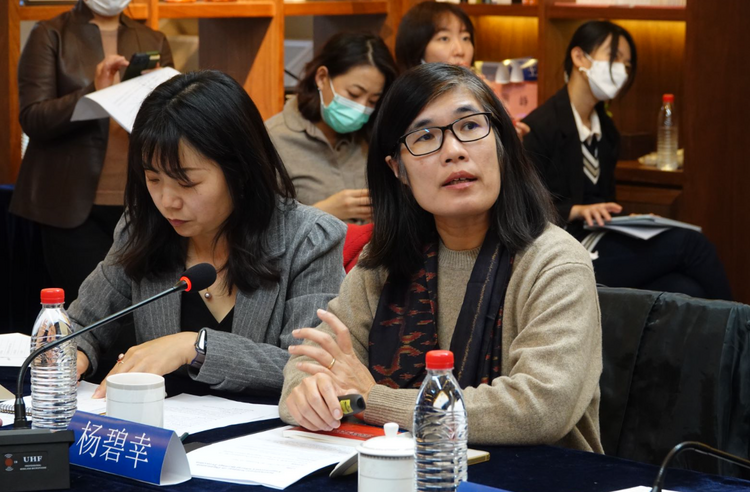
Yang Bixing, Head of the Culture Department of UNESCO Beijing Office, delivers a keynote speech.
At the seminar, experts from various spheres shared the details regarding the current application of digital technologies to the field of cultural heritage, and discussed the future directions and trends. Yang Bixing, Head of the Culture Department of UNESCO Beijing Office, noted that the protection of cultural heritage is currently fraught with challenges. Digital technologies serve as important tools to effectively promote cultural management and exchange, and boost the sustainable development of cultural heritage. They also play essential roles in raising public awareness of cultural heritage protection, steering public attention towards it, and enhancing their participation in relevant work, especially among young generations.
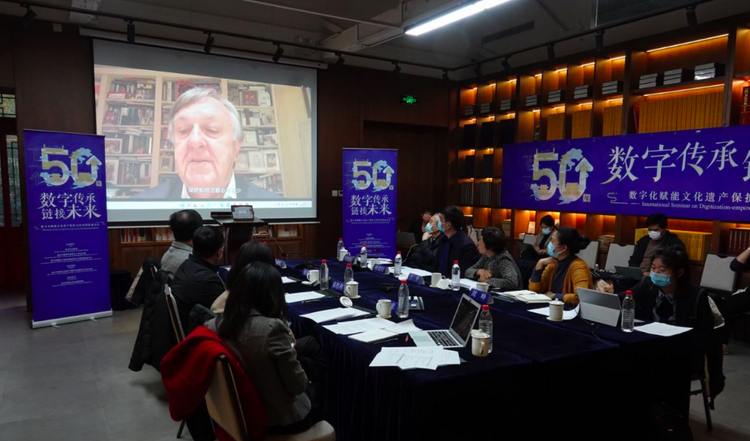
Hans d'Orville, Chairman of the Advisory Committee of ICCSD, delivers a video speech.
Speaking of the need to use digital means to preserve cultural heritage, Hans d'Orville, Chairman of the Advisory Committee of ICCSD, remarked in his speech that digitalization allows wider access to heritage without any physical or spatial constraints. "Through a variety of media means, digital contents enable viewers and students to experience an object, a place, a site, or a cultural practice more in an in-depth manner rather than just see an image." He believed that digital approaches have provided new possibilities for the preservation, protection and popularization of cultural heritage while raising the issues of intellectual property rights. Therefore, it is necessary to make strategic planning, including protecting cultural heritage sites and items by treating them as intellectual properties, taking cultural heritage digitalization as commercial means, and recognizing cultural heritage sites and items as the assets of the creative industry to help tackle relevant issues. He later cited the cases of Lushan Mountain, Mogao Grottoes, Notre-Dame Cathedral in Paris and the ancient Roman city of Pompeii as typical examples, explaining that digital practices will not only help preserve cultural heritage, but also improve the well-being of the world.
Regarding how digital technologies can enhance public participation, Shu Zhan, Vice President of Tencent Research Institute and Head of Tencent SSV Digital Culture Lab, took the "Digital Central Axis" project as an example to share practices and exploration in stimulating the innovative revitalization of Beijing's Central Axis and enhancing public participation.
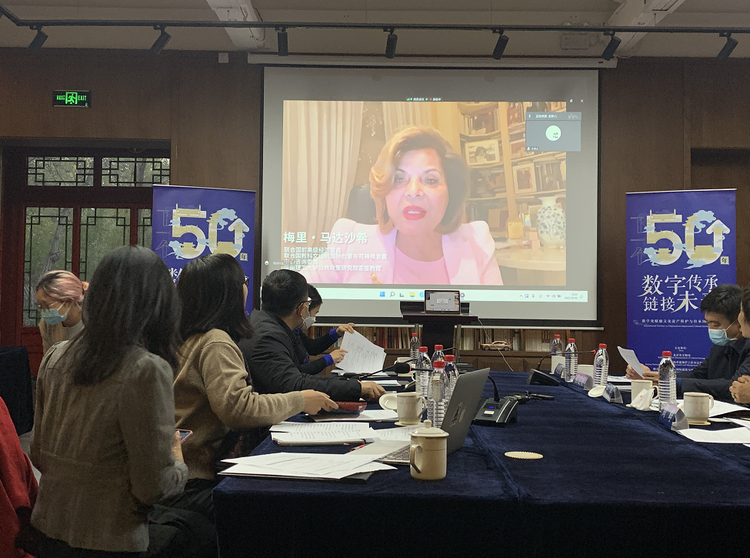
Mehri Madarshahi, a former Senior Economist of the UN Secretariat, delivers a video speech.
Speaking of the practical application of cultural heritage digitalization, Chen Shengli, Editor-in-Chief of China Digital Culture Group, explained digital application in the fields of books, documentation, public culture, cultural relics, art, intangible cultural heritage and others with a wealth of cases. Mehri Madarshahi, a former Senior Economist of the UN Secretariat, shared stories concerning the viable and sustainable digital development of Europe's digital assets of cultural heritage across borders, languages and sectors, which was intended to improve capacity-building, innovate digital entertainment and explore ways of participation for European people.
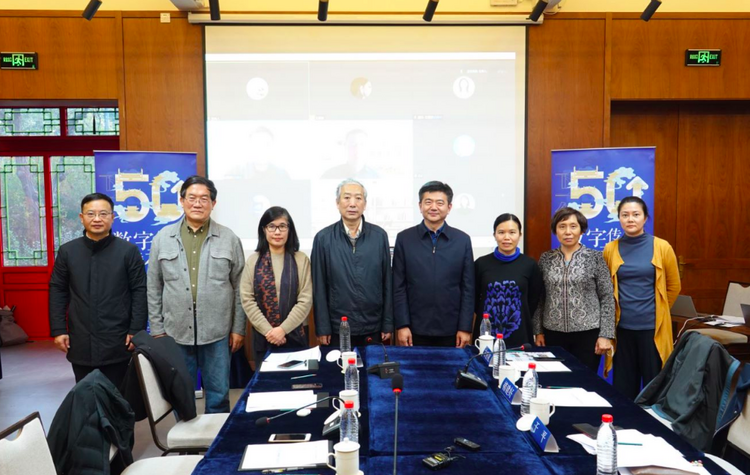
A group photo of the participant guests
The seminar was moderated by Yu Ping, Counsellor of the Counsellor's Office of the People's Government of Beijing Municipality. Several experts and scholars attended the event and delivered keynote speeches, including:
Zhang Xiaoming, Researcher of the Chinese Academy of Social Sciences (CASS) and Vice Director of CASS China National Center for Culture Studies;
Song Weizu, Member of CPPCC Beijing Municipal Committee, First-level Official of Beijing Municipal Committee of China Democratic League, and Senior Engineer of Industrial Design;
Chen Hong, Deputy Director of the Key Laboratory of Interactive Technology and Experience System of the Ministry of Culture and Tourism, Beijing University of Posts and Telecommunications;
Yang Yueming, Professor and Vice President of the Institute of Cultural Innovation and Communication, Beijing Normal University, and Advisory Member of ICCSD;
Michele Brunello, Professor at the Polytechnic University of Milan, Curator of "Across Chinese Cities" at Venice Biennale, an Italian architect.